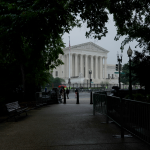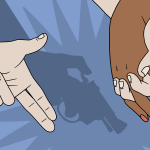A bipartisan gun safety bill passed Thursday by the Senate expands federal restrictions on domestic abusers’ ability to own a gun in an effort to close the regulatory gap known as the “boyfriend loophole.” However, experts and advocates point out that the loophole isn’t closed completely.
Under current federal law, anyone convicted of a misdemeanor crime of domestic violence, or subject to a domestic violence protective order, cannot possess a firearm, but only if the offender is a current or former spouse, shares a child with their victim, or has lived with their victim at any point. Other abusive partners are not restricted from gun ownership under the law, a loophole researchers and advocates have been pushing lawmakers to fix for years.
Although Sen. Chris Murphy of Connecticut, a lead Democrat negotiator for the gun package, has stated that the bill closes the boyfriend loophole, experts told The 19th that Congress’ proposal doesn’t go far enough to protect women in abusive relationships.
The stakes are high: At least half of women homicide victims are killed by intimate partners.
Under the bill, which passed the Senate by a 65-33 vote late Thursday and now heads to the House, being in a “current or recent former dating relationship” with a victim would be enough to bar a convicted abuser from possessing a gun. However, for first-time offenders, the legislation would waive this restriction for dating partners after five years if they are not convicted of another misdemeanor.
Additionally, the current bill does not apply to abusers subject to final protective orders, which are granted to abuse victims after a court hearing and can last for at least a year.
A congressional aide for Murphy said that while the senator has been clear throughout the negotiation process that the bill is not perfect, he still believes it will save lives. When asked about the current version of the bill only partially closing the loophole, the aide reiterated that the bill is a compromise that does not accomplish all of the Democrats’ goals on gun legislation.

Kelly Drane, research director at the Giffords Law Center to Prevent Gun Violence, said that while the bill “is a huge step forward” that would still increase safety for victims, its limitations are somewhat disappointing.
Only covering “recent former” partners would not cover abusive partners who can still cause harm after the relationship has ended, she said.
Additionally, while the bill expands the definition of who could qualify as a convicted perpetrator of domestic violence, it does not reference abusers who are subject to protective orders or add dating partners to the definition of an intimate partner. That additional expansion for intimate partners would be necessary to fully close the loophole, since the Senate’s proposed bill would alter how dating relationships are defined in a different subsection of the federal criminal code — while the legal determination of an intimate partner that protection orders rely on would remain unchanged.
This would allow abusive dating partners subject to such orders to still have firearm access, experts said.
“It is important to note that this bill will only partially close the boyfriend loophole,” Drane said.
Allowing abusers served with full protective orders to still access firearms leaves “a pretty gigantic loophole” in the law, said Rachel Graber, director of public policy at the National Coalition Against Domestic Violence. Such orders are issued when a court has found a survivor to be in immediate danger..
“I think there’s a sense among some people that protective orders are not that serious, and that’s not the case at all. They’re very serious. And they’re issued basically to prevent irreparable damage. To prevent people being severely injured or killed,” she said.
Murphy’s office said that, moving forward, the senator wants to work towards expanding weapons restrictions to abusers subject to such protection orders.
Christina Dardis, an assistant professor at Towson University who specializes in interpersonal violence, agreed that the bill is a step forward. Still, she warned that the “seeming arbitrariness” of that five-year timeline presents a new loophole, since the same restoration is not offered to current or former spouses or abusers who share a child with their victim.
Murphy’s aide said that the goal of this provision was to narrowly restore Second Amendment rights to a specific category of abusers — not to current or former spouses, or other groups already subject to the law.
The five-year requirement may also place a greater burden on survivors of intimate violence, Dardis said, if they go to court or press further charges in an attempt to extend weapons’ restrictions — a fight that former spouses would not have to go through.
“The bottom line is that the legal status of your relationship is still allowed to determine your level of safety from your former abuser, and there remains an arbitrary dividing line between former dating partners and former spouses of who is, and is not, permitted lasting protection against their perpetrators’ firearm ownership,” Dardis wrote over email.
However, in Drane’s view, more research is needed to understand the consequences of the five year restoration period in the bill — especially since the risk of someone committing future crimes may decrease the longer that person goes without doing so.
Several studies have shown that domestic abuse victims who face gun violence are experiencing heightened physical and emotional stress, even compared to those assaulted with other weapons such as knives, said T.K. Logan, a professor at the University of Kentucky College of Medicine who researches trauma and interpersonal violence.
When the threat of gun violence is added into an abusive relationship, that threat just deepens the harm the victim faces, Logan said.
“Guns are deadly, right? We all know that. So it’s just a different level of threat,” she said.
Her recent study found that, within a small sample of mostly White college-educated women, there was no significant difference in the firearm threats faced by women who lived with their abusive partners versus those who didn’t.
Women in both groups said their abusive partners, predominantly men, threatened to shoot them or someone they knew, used weapons other than guns to hurt them or sexually assaulted them. At nearly the same rate, both groups said the gun threats made them less likely to talk to police. The only real difference: Women not living with their abusive partners aren’t protected the same way under federal law.
How courts may interpret the definition of a dating relationship as laid out in the bill, if it gets passed into law, worries Dardis.
The length and nature of the relationship between victim and abuser, as well as the frequency and type of interaction, will determine whether it can be considered a dating relationship protected under the proposed law.
A court may decide that a dating relationship would not apply to weapons restrictions if it appears too brief, not recent enough, or if there was not enough interaction between partners, she said.
“We know that the process of separation from abusive relationships can take a great deal of time, and that stalking and violence, can, in some cases persist even for years after relationships end, so it is concerning that relationships that were not ‘recent’ enough, in the eyes of the court, would not be covered by this law,” she said over email.
The bill’s passage in the Senate meant that its supporters had cleared another hurdle needed to pass the legislation before Congress’ scheduled two-week Independence Day recess. The legislation is on track to be taken up by the House on Friday.
The fight for any recent federal gun control legislation has largely faced stiff opposition. This week’s proposal was put together in response to the massacre last month of 19 students and 2 teachers at Robb Elementary School in Uvalde, Texas — the second-deadliest mass shooting at an elementary school in the nation’s history. Still, Republicans in the House have voiced opposition to the bill, and it could still be amended or have language struck from it through the consideration process. Past efforts to close the loophole have failed, most recently during the push to renew the Violence Against Women Act.
Sen. Amy Klobuchar, who introduced legislation in 2013 to close the boyfriend loophole and has since reintroduced the bill several times, told The 19th prior to the bill text being released that tackling the issue is still crucial, despite years of roadblocks.
“It just keeps getting shoved aside, honestly,” she said.
While the bipartisan package is a good first step to closing the boyfriend loophole, Congress still needs to pass legislation barring dating partners subject to final protective orders from having guns, Graber said. Grants should also be made available to states to develop and carry out policies to make sure that abusers covered by the law actually relinquish firearms, she said.
The Centers for Disease Control and Prevention has found, year after year, that half of female homicide victims are killed by a current or former intimate partner. That trend continues in 2019 data from the agency’s latest violent deaths report.
While federal law currently only affords protections to certain types of relationships, research shows that the risks of domestic abuse are not so rigidly defined to married couples or couples that have children together.
The Giffords Law Center has tracked 28 states, plus Washington, D.C., that have passed legislation to partially or completely close the boyfriend loophole. To Drane, completely closing the loophole is necessary to protect women in violent relationships that have the potential to turn deadly — especially when many women don’t want to get married quickly or at all.
“This updates our laws to be more congruent with what intimate partner relationships look like today,” she said.







